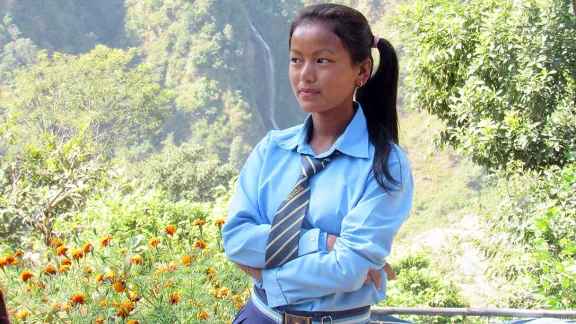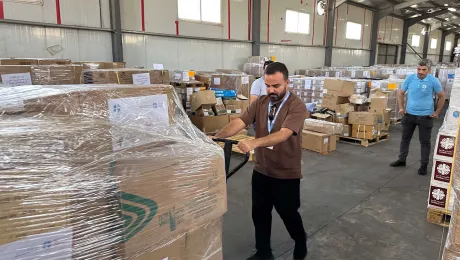
Sanu in her school uniform. The prospect of higher education prompted her to find a way of attending school, even though school is a day's walk from home. Photo: Umesh Pokharel/LWF Nepal
LWF helps Nepal’s children resume education
It’s a whole day’s walk for 16-year-old Sanu Lama and her friends to reach their school in Baramchi, Nepal. Sanu lives in the village of Gumba, somewhere in the Himalaya mountains of Nepal’s Sindhupalchowk district.
Until two years ago, Sanu was able to attend school in her own village. She completed her education up to grade 8 at a local school. Her strong performance however raised the question of higher education. Her mother was opposed to sending her to the school in Baramchi. Sanu’s determination, thirst for knowledge and willpower eventually convinced her parents to send her to Shree Ratna Rajya secondary school in Baramchi, where she is now in grade 10.
Her example encouraged four other female students from her village, who are making the same journey now. They have rented a small room near the school, where they support each other in school work and the ups and downs of teenage life.
Earthquake changed everything
The big earthquake which hit Nepal in April 2015 and the frequent aftershocks almost ended their dreams of higher education: their school was completely destroyed, and even when lessons started again, the frightened families refused to let the girls go.

Sanu, Dolma and the other students from Gumba who travel to Baramchi school
“Since our house had collapsed, my family needed me and tried to convince me not to go school,” 15-year-old Dolma says. Beside some very practical help in the house, the teenager was also needed to provide emotional stability. Sindhupalchowk was hit harder than other districts. It is the district with the highest death toll from the earthquake. The family was convinced that keeping their loved ones close was the only way to deal with the uncontrollable forces of nature.
The Lutheran World Federation (LWF) was among the first aid organizations to reach Gumba village. Its first action was to distribute tarpaulins and blankets, and to repair the drinking water system. But after the outer destruction had been taken care of, they turned to the shattered inner peace of Gumba’s inhabitants with psychosocial support.
Dance, drama, counselling
“They started many activities in or village,” Dolma recalls. “There were cultural events, folk dances and drama performances. That was very effective in making life in the village normal again.” LWF Nepal and local partner organization Gramin Mahila Srijansil Pariwar (GMSP) formed support groups where the community had an opportunity to share their fears, anxiety and pain over the loss of friends and family, receive support from community members and be referred to professional counseling sessions.
Dolma and her friends are certain these psychosocial activities eventually helped their parents to face their fears, and to allow their daughters to continue school.
Repair the school, protect the children

The provisional school building where the Gumba students now study. It was erected with the help of LWF and the International Organization for Migration
Meanwhile, LWF had received a call from the Ratna Rajya school management committee. Together with another partner, LWF helped the committee to construct a temporary school building.
With the same local partner as in Gumba village, LWF Nepal provided the school with sports equipment like volleyballs, badminton rackets, cricket equipment and skipping ropes, and traditional music instruments. Together with the physical exercise and a school based cultural program, LWF and GMSP offered psychosocial activities for the students as well.
Institutionalization of pscychosocial activities
Schools feel that PSS activities have not only contributed to enhanced psychosocial wellbeing of the school children, but also encouraged school to mainstream psychosocial activities in the regular extracurricular activities of the schools. “Government of Nepal current curriculum for primary level provisions is to have physical education and creative expression art as a compulsory subject. However we used to take the subject lightly. But now we have internalized the importance of the subject for building the psychosocial wellbeing and maintenance of it,” Bhesh Ram Upadhyaya, a teacher in the school says.
Apart from that school has prioritized the activities aimed at enhancing psychosocial wellbeing as one of the major activities in extracurricular activities that are organized every Friday. They can participate in yoga therapy, recreational and cultural activities to express themselves and their feelings.

Students Pramita, 14, and Prabin, 16, Sapkota lost their grandfather in the 25 April earthquake last year. “It felt like our family had drowned in grief,” they recalled. “All these psychosocial activities refreshed us and provided an alternative perspective to deal with suffering and pain.”
Sanu, Dolma and the Sapkota siblings are but some of the many children in earthquake affected areas who are living far from their home to pursue education. As the long-distance walks and living away from the family protection also pose many risks to the students, who normally are still underage, LWF also encouraged schools to include messages on child protection, trafficking and the dangers of early marriage into their program.
According to Rishi Ram Poudel, a teacher in the school, the idea was well received. “We developed drama performances and cultural shows around the topics of child/human trafficking, the importance of education and negative consequences of child marriage. That was very effective: we have received a request from the community to perform such drama again.”
Photos and story contributed by Umesh Pokharel/LWF Nepal. Edited by LWF Communications.


